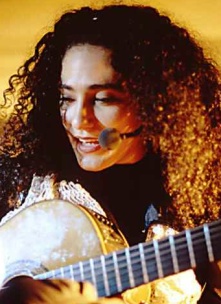Featured artist:
BADI ASSAD

I’m
not exactly sure how she manages to sing so effortlessly, that
is independently from guitar accompaniment – a feat that
would ordinarily require two people for its execution –
except to say the complex chording, trilling and contrapuntal
melody lines both complement and compliment her vocals. As to
what genre the Badi Assad playlist belongs, that’s also
a call-it-as-you-hear-it judgment. But what is beyond dispute
is that there are no more than a handful of people in the world
who can carry it off as well as she right now.
Badi
hails from Brazil, from a family steeped in music: her father
plays the
bandolim while her celebrated
older brothers, Sérgio and Odair (Duo Assad), have been
composing and recording music for more than 20 years.
Nonetheless,
for the occasion of her solo concert at the 2006
Montreal Jazz Festival, I didn’t
know what to expect. I only knew what I saw of her two years earlier
when she was invited to tour with guitar luminaries Larry Coryell
and John Abercrombie. On that stage, this relatively unknown more
than held her own, on top of which she exuded so much natural
sylph and charm that every closet male groupie in the audience
was outed on that hot and funky Montréal soir
As a
singer/soloist, and always on top of rhythmically intricate strumming
and guitar picking, Badi emerges from her music like a an exotic
glade creature, often sprinkling into her melodies the naturally
occurring sounds and commotion of the jungle, or percussive effects
that recall the tabla and mridang. Her music
is an acoustic adventure that undulates straight into the mystery
of things, where surface is merely the entry point to worlds only
music can reveal. She is so irrepressibly expressive and spontaneous
that we accommodate her bending, grimacing, brooding and eruptions
of joy as simply the natural outcomes of music that radiate from
deep within. Badi doesn’t just perform her solo symphony,
she is her symphony, generating moods and spaces that are signature
breezy and organic.
 Her
guitar work deserves as much attention as her singing and interpretation,
where from one song to the next, you don’t encounter a common
chord or predictable sequence of notes, all of which she makes
familiar through her deep commitment to and uncompromising love
of song and composition. And if it all initially sounds so “strange
and strong” there isn’t a trace note of affectation
in her writing. Unlike far too many ambitious, self-conscious
song writers who reject the common chord for an obtuse one (when
the former works better), Badi’s inspiration, like J. S.
Bach’s fugue writing, takes its cue from the introductory
theme which foretells the piece’s development; and like
an instrument at the bidding of higher forces, she serves the
creative process no matter where it takes her until the song is
brought to completion. When after repeated listening the novelty
has worn off, the music still stands tall because the architecture
upon which all lasting music depends combines in equal parts both
form and heartbeat. If from time to time, the flavour of the music
harkens back to her native Jobim-Brazil sound, there is never
any doubt that we are in new territory. Here, there and everywhere
the ear is treated to interlocking chains of enticing, enigmatic
chords that are so convincing in their lyricism and narrative
flow that we cannot help but delight before the possibility that
a previously unsuspected well-spring of music has been unveiled.
Her
guitar work deserves as much attention as her singing and interpretation,
where from one song to the next, you don’t encounter a common
chord or predictable sequence of notes, all of which she makes
familiar through her deep commitment to and uncompromising love
of song and composition. And if it all initially sounds so “strange
and strong” there isn’t a trace note of affectation
in her writing. Unlike far too many ambitious, self-conscious
song writers who reject the common chord for an obtuse one (when
the former works better), Badi’s inspiration, like J. S.
Bach’s fugue writing, takes its cue from the introductory
theme which foretells the piece’s development; and like
an instrument at the bidding of higher forces, she serves the
creative process no matter where it takes her until the song is
brought to completion. When after repeated listening the novelty
has worn off, the music still stands tall because the architecture
upon which all lasting music depends combines in equal parts both
form and heartbeat. If from time to time, the flavour of the music
harkens back to her native Jobim-Brazil sound, there is never
any doubt that we are in new territory. Here, there and everywhere
the ear is treated to interlocking chains of enticing, enigmatic
chords that are so convincing in their lyricism and narrative
flow that we cannot help but delight before the possibility that
a previously unsuspected well-spring of music has been unveiled.
If Bach
were alive today, he would approve of Badi’s contrapuntal
achievement, where autonomous voice and instrument conjoin to
serve music’s most precious category – song. I have
always maintained that if accompaniment diminishes interpretation
by only 1%, the singer should drop the instrument. Rather than
naming names who could benefit from a reduced mandate, I’ll
positively mention John Pizarelli, who along with Badi, like runners
for whom legs and lungs operate as one, are examples of performers
whose singing and playing merge to demonstrate the musical equivalent
of sing-ularity.
Listen
to the incomparable Badi Assad sing "O
Mundo É Um Moinho" from her latest
album Wonderland.
Click
HERE
to see Badi perform.